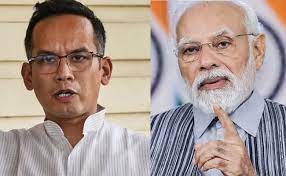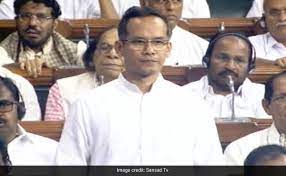Shift from Rahul to Gogoi:
“Gogoi, in place of Rahul, initiated the motion of no confidence.” MP Nishikant Dubey said – Seems like Rahul ji wasn’t prepared today, must have woken up late.
A discussion on the motion of no confidence is taking place in the Lok Sabha on Tuesday. Congress MP Gaurav Gogoi delivered a 35-minute speech on his motion of no confidence. During this time, he criticized the government on issues ranging from Manipur to foreign policy. He stated that the Prime Minister must accept that his double-engine government failed in Manipur, leading to the deaths of over 150 people in the state.

Gogoi remarked, ‘The Chief Minister of the state should have fostered an environment of dialogue, peace, and harmony. In the past 2-3 days, he has taken provocative steps that have created tension in society.’ In response, Nishikant Dubey from the government side replied, saying, ‘We expected Rahul Gandhi to speak, but he didn’t. It seems Rahul ji wasn’t ready today; he must have woken up late.’
PM Modi could respond to the motion of no confidence on August 10.
Gogoi raised three questions to the government:
- Why didn’t Prime Minister Modi visit Manipur? Rahul went, MPs from the INDIA Alliance went, the Home Minister went.
- Why did you take 80 days to speak about Manipur? You spoke for only 30 seconds. Till now, no words of empathy have been expressed. The importance of the words of the Prime Minister, as the head of the government, is not present in the words of any minister. If the PM takes steps for peace, that’s good, the steps of a minister don’t hold that power.
- Why wasn’t the Minister of Manipur dismissed? In Gujarat, when there was a need for politics, the Chief Minister was changed not once but twice. It happened three times in Uttarakhand, and in Tripura. Does the CM of Manipur possess some special blessings, as he’s admitting to an intelligence failure?
Gogoi also made three requests to the PM:

- Stay in the House, attend discussions in both Lok Sabha and Rajya Sabha.
- Go to Manipur with the entire party delegation. If all party delegations go, we will also go.
- Meet with social organizations in Manipur.
By not initiating the motion proposed by Rahul, the BJP has taken advantage:
By not initiating the motion proposed by Rahul, the BJP has taken advantage of the situation. As soon as Gogoi initiated the motion of no confidence, BJP MPs started creating a ruckus. They said, ‘In the morning, a letter was received from the Secretary-General’s office that Rahul Gandhi ji will speak. We were waiting for his speech. Now, Gaurav Gogoi is speaking. What happened in 5 minutes? Earlier, when the proceedings began at 11 AM, they were suspended until 12 PM.’
Congress MP Gaurav Gogoi had given notice for the motion of no confidence on behalf of the opposition alliance INDIA on July 26, which was accepted by Lok Sabha Speaker Om Birla. This is the second time since 2014 that a motion of no confidence against the Modi government has been brought.
What is a motion of no confidence?
The Lok Sabha represents the people of the country. Elected representatives of the people sit here, and hence, it is essential for the government to have the confidence of this House. A government has the right to stay in power only if it has a majority in this House. To pass such a motion, more than 50% of the total members present and voting in the Lok Sabha are required.
After 2019, PM Modi has participated in debates in the Lok Sabha 7 times. According to parliamentary records, after 2019, PM Modi has participated in debates in the Lok Sabha a total of 7 times during the term. In five instances, he responded after the President’s address. Additionally, once, he spoke as the Prime Minister during the swearing-in ceremony of Lok Sabha Speaker Om Birla.
During a motion of no confidence, MPs from all parties ask questions related to their states or the country. The government is required to answer. In 2018, TDP MPs had raised questions related to Andhra Pradesh.

Numerical Strength:
Out of the 537 members in the Lok Sabha, the opposition alliance INDIA has 143 MPs. In contrast, the government’s supporters have approximately 333 MPs. In this scenario, the government would have an upper hand in terms of numerical strength.
Backlash after the Motion Fails:
There is a possibility that after the motion of no confidence fails, the Modi government might use this issue to criticize the opposition during the 2024.
In the last 60 years, motions of no confidence have been put forth in the Lok Sabha several times. These motions are a way for the opposition to express their lack of confidence in the ruling government’s ability to govern effectively. The history of these motions varies, with some failing and others passing. Here’s a brief overview:
1979: A motion of no confidence was moved against the government led by Prime Minister Charan Singh. This motion was successful, and the government lost the vote of confidence.
1989: Another motion of no confidence was brought against Prime Minister Rajiv Gandhi’s government. However, this motion was defeated, and the government retained its position.
1996: A motion of no confidence was moved against Prime Minister P.V. Narasimha Rao’s government. The motion was successful, leading to the fall of the government.
1997: A motion of no confidence was again moved against a government led by Prime Minister H.D. Deve Gowda. However, this motion was defeated.
2003: A motion of no confidence was introduced against the government of Prime Minister Atal Bihari Vajpayee. This motion failed to pass, and the government remained in power.
2008: Another motion of no confidence was moved against Prime Minister Manmohan Singh’s government. The motion was not successful, and the government continued to govern.
2018: A motion of no confidence was brought against the government of Prime Minister Narendra Modi. This motion was defeated, and the government retained its position.
These instances show that while motions of no confidence have been used as a tool by the opposition to question the government’s performance, their success or failure depends on the support they garner from other members of the Lok Sabha.
